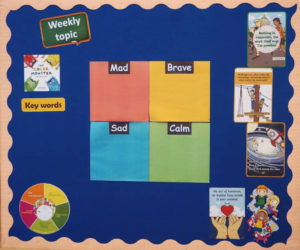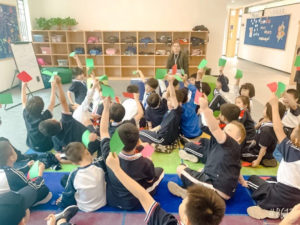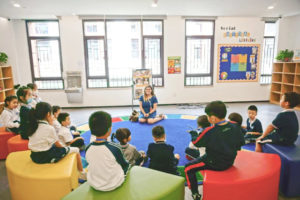What is Social Emotional Learning?
Social Emotional Learning (SEL) has received a lot of attention for many reasons. This learning program has become a global educational trend that cannot be ignored. Many organizations led by UNESCO are vigorously promoting SEL to the global education sector. Through SEL, students will learn to appreciate themselves, care for others, and manage emotions the right way. These skills are at the core of being able to adapt to their lifelong development. We believe that through the school’s profound education, we will meet SEL’s clear goal, have extensive influence, and benefit the students in multiple ways. Our common vision is the future of children.
Why do we need to deliver social emotional learning?
Hear from several leaders in the SEL program at BASIS International School Nanjing on the importance of incorporating social emotional learning into our curriculum.
Jonathan Lewis, Boarding Director
In my opinion, the answer to this question is simple. If I am feeling isolated from my pers and experiencing negative emotions that I struggle to control, I am unable to learn effectively. The feelings I might be experiencing or the isolation I sense may be a consequence of making poor choices in my relationships or interactions. Perhaps it is even from acting in a way from which I am oblivious. Sometimes I may cause others to feel unhappy without intention. I may be being insensitive intentionally or I may be unaware of the effects of my behavior or choices on others. This all makes for a potentially hostile learning environment, not something that achieves success for all.
In a community such as ours, we all exist together struggling to meet our needs and our desires. We strive to beat our best scores and achieve our expectations and beyond. In this effort, there can sometimes be struggle or conflict as different people seek similar goals. The inadequacies of some may be projecting against those with more success, in an attempt to avoid the truth and gain a sense of control. The level of control which we achieve and yield in school can often determine our mood or sense of purpose.
The social and emotional tools we teach our students will enable them to:
- Build relationships
- Resolve conflict
- Make good choices
- Promote self-esteem
- Respect others and be kind
- Create independence
- Develop emotional intelligence
- Develop learning and thinking skills
At BASIS International School Nanjing we are committed to helping our community feel happy and safe. We have lessons in social-emotional learning skills across the whole school from Pre-K to grade 10. In addition to the SEL lessons, we provide academic enrichment lessons, academic advisors, weekly grade-level assemblies in Middle School, support tutors, counselling support, and a college counsellor, as well as Deans. In the Primary and Middle Schools, the Second Step program is being used to support our social-emotional development.
Quinnesian Joyner, Dean of Primary Years
At BASIS International School Nanjing, we use practical strategies for teaching social emotional learning (SEL), mindfulness, and movement to help our learners maintain positive relationships, assume responsibility, become bodily aware, and grow into productive contributing citizens. We are building SEL skills in the classroom while incorporating feeling vocabulary, sign language, coping strategies, grade level community meetings, and now school assemblies. SEL encompasses a variety of skills to help with individual student growth. It also provides a foundation for safe and positive learning, as well as enhances the students’ ability to succeed in school, careers, and life. The goal of education is to prepare students academically, socially, and emotionally for success, now and in the future; with SEL we can accomplish this goal.

Social emotional topics learning board.

Students hold up color cards that reflect appropriate behavior at school. The cards are used to aid in asking questions about what is good and bad behavior.
Amber Scullion, Primary Humanities Teacher
Our BASIS International School Nanjing Lower School will utilize the Second Step Program for our SEL implementation. Second Step is a program rooted in social emotional learning (SEL) that helps transform schools into supportive, successful learning environments uniquely equipped to help children thrive. Each week the Second Step curriculum introduces a new focus that aligns not just to the social and emotional developmental age of each grade level, but also the academic needs. In the K – 4 curriculum, the first unit places focus on building students’ listening and learning skills–which aid in building positive learning-focused classroom communities.

Ms. Scullion teaching SEL in class.
On Mondays, we usually hold a class meeting, where we teach the lesson of the week. The lesson always includes a kinesthetic, visual, and auditory activity that reviews previously taught skills and introduces the new one. The rest of the week, the skill is reinforced in the classroom using different “Brain Builders” and other activities that relate to the skill. The idea is to practice the skill and vocabulary taught on the first day, similar to how we would practice a new routine or procedure in the classroom. Second Step provides “Follow Through” cards which also provide other daily practice ideas for each lesson, vocabulary, and even a formative assessment to measure the students’ understanding of the skills and concepts. As a Primary Team, we are making an effort to share the resources and the skills the students are learning so we can keep the language and interactions with the students consistent and help in reinforcing the skills being taught across the grade levels.
Visit our careers website for more information about teaching with BASIS International Schools and to view open positions for the 2021-22 school year!